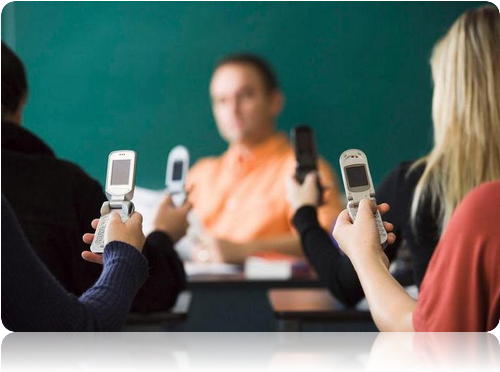Cell Phones Create Controversy
A comparison of Tunstall and GW cell phone policies

High school cell phone policies differ based on school board policy, not within the individual schools. Pittsylvania County School Board’s cell phone policy states as follows: Any communication device (cellular telephone, beeper, etc.) that is seen or heard, or used without authorization during the school day (8:00 a.m. to 3:10 p.m.), or on school buses at any time will be confiscated by school personnel and placed in the school vault until reclaimed by a parent. This policy also applied to those students who normally leave campus early or who have an early dismissal. Disciplinary sanctions are: first offense = 3 days ISS; second offense = 1 day OSS; third offense = 3 days OSS.
While our policies in the county are being enforced, a very different policy is being given by authority just minutes away in the city, particularly at George Washington High School. The following policy is enforced at GW: Cell phones may be used during limited times during the school day. Possessing a cell phone at school is a privilege, not a right. Cell phones must be registered through the security office; failure to do so may result in disciplinary action. The school system retains the authority to ensure the proper use of the phones. Students are responsible for the care, security, and the use of their cellular device during school activities and events.
1. Cellular devices may NOT be used during class time. Cellular devices should be in a pocket, purse, and back pack or in a belt holster during class – not being held in the hand or placed on a desk. No headphones or wireless earpieces may be attached to the device. 2. During class changes, students will be permitted to use cellular devices to place calls as they wish as long as no classes are in session anywhere in the building. When the warning bell sounds, phones must be powered down and put away. No calls may be placed during the lunch block as most students are in class at that time, only before first lunch and after the last lunch. No pictures shall be taken during the school day. 3. Students are not permitted to possess a cellular device during SOL test administration, SAT, ACT, AP, and/or teacher-made tests/quizzes.
Although the times restrictions are even tighter to make it to class on time at GW, 5 minutes to be exact, the privilege of accessing his/her phone in the hallway is allowed, according to the above text. This privilege is seen as a positive one to whom it is given. “It’s beneficial! Because we can call our parents without having to go to the office. And if something happens, we have our phones,” says junior at GW, Marybeth Worley.
Cary Wright, English teacher at GW, informs that the trial period from first semester has been extended further. He believes the fact that students have the opportunity to get their technology fix before returning to class is one suggested satisfactory factor of the new cell phone policy. Though he approves of the policy at GW, he recognizes certain challenges with the policy concerning cell phones at lunch and in the halls. “Sometimes they are not turned off when coming into the room,” Wright said.
Possible reasons behind the Pittsylvania County School Board’s policy is the issue of students not arriving to class on time. Various complaints have been made by students concerning the seven minute time period given between class periods. If cell phones were allowed between classes, the issue of time restraints would only increase. Another possible reason is the issue of cheating. Accessibility to other’s answers, as well as answers provided by the World Wide Web, becomes easier with cell phone access. Lastly, contacting others regarding inappropriate matters becomes much simpler and would likely occur on a more regular basis.
Students at Tunstall disagree, explaining that cell phone access at lunch and between classes would not interfere with classes. “People wouldn’t be so tempted to use them in class secretly if we could use them at lunch and between classes,” says junior Victoria Sater.
The most popular reason students use as an excuse for having their phones is that they needed to contact their parents. The resolution to this excuse is access to a public phone in every school’s main office. Although the students have access to the public phone, students still have to get permission to use the phone. Allowing cell phones during class change and lunch would give students a quick technology fix and an opportunity to contact their parents about possible cancelled sport practices or changed plans after school.
Your donation will support the student journalists of Tunstall High School. Your contribution will allow us to purchase equipment and cover our annual website hosting costs.

As a junior, Gabby Stowe is in her second year of being on the Trojan Messenger staff. Other than keeping up with responsibilities of the Trojan Messenger,...












